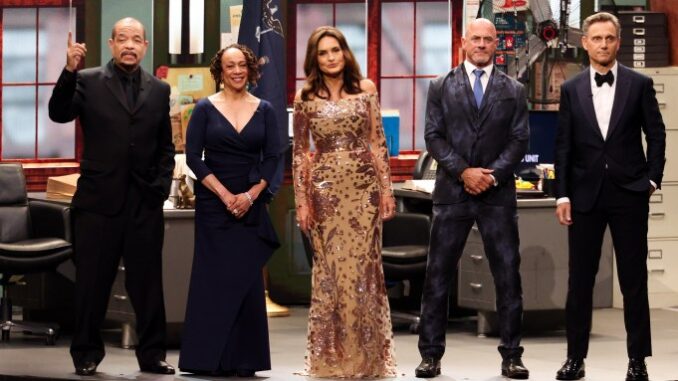
The Quiet Crucible: What Makes Olivia Benson Different from Other TV Heroes?
In the vast pantheon of television heroes, from the unflappable action star to the genius detective, a certain template often emerges: the lone wolf, the physically dominant force, the brilliant mind that solves puzzles with cold logic. Then there is Olivia Benson. For over two decades, as the beating heart of Law & Order: Special Victims Unit, Benson has redefined heroism, not through superhuman feats or grand pronouncements, but through an unwavering, often agonizing, commitment to empathy in the face of humanity’s darkest acts. What truly sets her apart is not just her focus on sexual violence, but the way her own profound scars become her greatest strength, forging a hero whose primary weapon is not a gun or a sharp wit, but an open, vulnerable, and fiercely protective heart.
Perhaps the most striking differentiator for Olivia Benson is that her primary investigative tool is empathy, not deduction or brute force. While other detectives might meticulously piece together clues from a crime scene or engage in high-speed pursuits, Benson often finds her breakthroughs by simply listening. She sits with victims, sometimes for hours, absorbing their trauma, validating their pain, and reflecting their courage back to them. This isn’t a passive act; it’s an active, emotionally draining process that requires her to open herself to the rawest forms of human suffering. Where a Sherlock Holmes type might detach to observe, Benson leans in, allowing herself to feel a fraction of what her victims have endured. This approach is profoundly different from the detached intellectualism of many TV detectives, or the physical prowess of action heroes. Her heroism lies in her ability to connect, to build trust where it has been shattered, and to guide the most vulnerable through an unimaginable ordeal.
Furthermore, Benson’s own history of trauma isn’t merely a backstory; it’s a crucible that has forged her unique brand of heroism. She is the child of a rape survivor, a fact that colors her understanding of systemic injustice and the long shadow of abuse. Later, as an adult, she herself becomes a victim of kidnapping and sexual assault. Unlike heroes who emerge from trauma seemingly invulnerable or seeking revenge through violence, Benson internalizes her experiences, transforming them into a wellspring of profound understanding and fierce advocacy. Her scars are not a weakness to hide, but a direct line to the pain of those she serves. When she tells a victim, “I believe you,” it’s not just a professional statement; it carries the weight of personal conviction and lived experience. This level of raw, integrated vulnerability in a leading TV hero, especially a female one, is rare and deeply resonant. She doesn’t just fight crime; she heals, in part, by extending her own hard-won understanding to others.
Moreover, the nature of Benson’s battlefield distinguishes her dramatically. She isn’t saving the world from global terrorists or uncovering vast conspiracies; she’s navigating the murky, often devastating waters of sexual assault, domestic violence, and child abuse. These are crimes that often occur behind closed doors, hidden by shame, fear, and societal silence. Her victories are rarely clear-cut, often involving messy plea deals, frustrating legal loopholes, and the long, arduous journey of a victim towards healing, not just conviction. This is a heroism defined by incremental progress, by advocating for the voiceless, and by shining a light on uncomfortable truths that society often prefers to ignore. It’s a quiet, grinding, and relentlessly human struggle, far removed from the explosive spectacle of many heroic narratives.
Finally, Olivia Benson’s endurance and evolution over more than two decades represent a heroism of sustained commitment. We’ve seen her grow from a fierce young detective to a compassionate sergeant, a resilient lieutenant, and now, a steadfast captain and adoptive mother. Her personal life, marked by profound loss and the challenges of single parenthood, intertwines inextricably with her professional dedication. She is not a static character, but one who has continually grappled with the emotional toll of her job, the moral ambiguities of the justice system, and the ever-present threat of violence. Yet, through it all, her core commitment to victims has remained unwavering. This longevity, coupled with such deep character development and the courage to show her vulnerability alongside her strength, paints a portrait of a hero that is complex, relatable, and profoundly human.
In a television landscape often saturated with archetypal heroes, Olivia Benson stands apart. She doesn’t wield a sword or command a spaceship; she wields empathy, a profound personal understanding of suffering, and an unshakeable will to fight for the dignity of the most vulnerable. Her quiet strength, born from personal trauma and sustained by decades of unwavering dedication, offers a powerful, enduring vision of heroism – one that resides not in the absence of fear, but in the courage to feel, to connect, and to never stop fighting for a justice that heals as much as it punishes. She is, in essence, the hero we need in a world grappling with unspoken pains.
